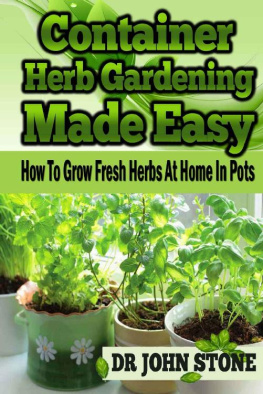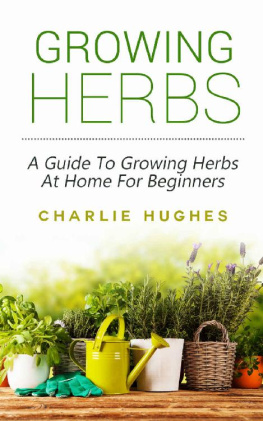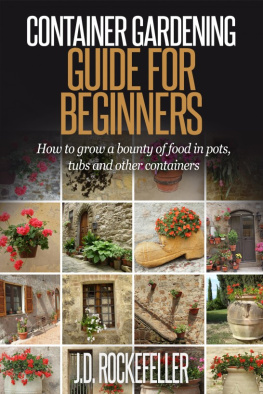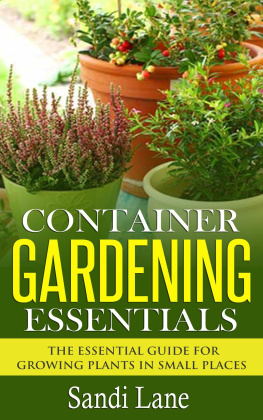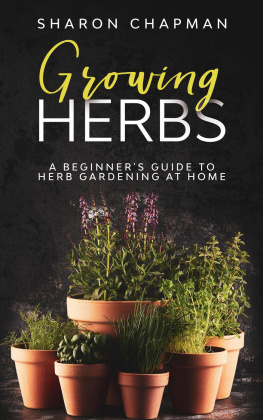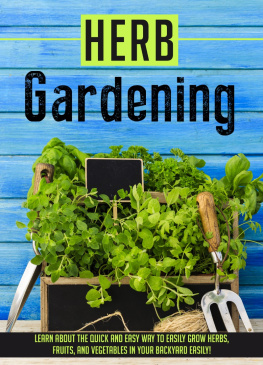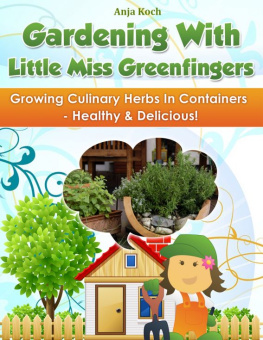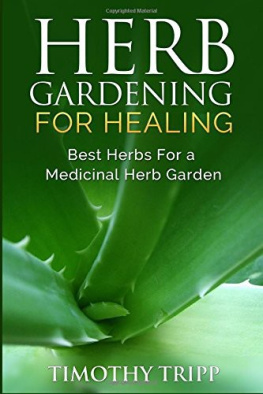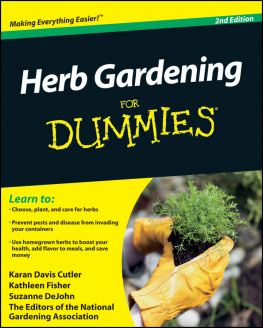Copyright 2014By Dr John Stone
This book or anyportion thereof may not be reproduced
or used in anyway what so ever without the written
consent of theAuthor except for the purpose of brief quotations for book reviews.
Introduction
Herbs have been an importantpart of human lives. They are used in a lot of dishes to add the aroma to themeals. We often come across recipes and dishes that ask for fresh Parsley,Basil or Chives and we end up using the dried herbs available in the marketwhich lacks the freshness and the aroma expected of it. Now, wouldnt it bebetter if you could have the same herbs freshly at your home? At a cost muchlower than what you pay in market? Well, weve got a solution for this. You cannow grow herbs at home at much less efforts and cost. You can grow almost anykind of herb at home like Chives, parsley, Basil, Cilantro, Thyme and muchmore. All these plants although require slightly different conditions to grow,however they are not difficult to provide because it does not need much spaceto grow. There are a lot of benefits of growing your own herbs at home, but oneof the major positive points is that the herbs are completely healthy and freeof all kinds of additives, chemical sprays and other genetically modifiedingredients that may affect your health.
To grow herbs at homeyou will need to carefully set a specific portion for them at home with enoughair supply. Herbs need little but regular water supply to grow in. Similarly,you will have to make sure that the herbs get enough light to get theirphotosynthesis properly. This way you will be able to grow natural herbs athome which would be inexpensive, convenient and healthy choice for your regularconsumption. The book in your hands will pick you from scratch and teach youall that you need to know in order to successfully grow herbs at your home. Soread it and start growing natural herbs at your home conveniently.
Chapter 1
TheBenefits Of Growing Your Own Herbs
With the availabilityof a wide variety of fresh and dried herbs these days at your local supermarketor grocer, why would you bother growing your own herbs? Why go to the troubleof getting your hands dirty and waiting patiently for your produce to grow whenyou can just open a packet and get the same basic ingredients? Well, here areonly a few of the many benefits you can enjoy from growing, rather than buying,your own herbs. Im sure after you start growing your own herbs youll findyour own reasons.
1. You willsave money- Fresh herbs, especially, can be very expensive when you buythem from your local supermarket and most people, once they have used what theyneed, will let the leftover herbs rot. Most herbs, once established, requirelittle work or maintenance.
2. Home grown herbs are ahealthier option.- As well as the known medicinal benefits of herbs, didyou know that adding herbs to your food is a great way to boost your vitaminintake?
3.Its an opportunity to learn- Theres so much tolearn about herbs, when you have your own ready supply of herbs, you will findnew and wonderful ways to use your abundant supply of herbs.
4. Youalways have a convenient supply of fresh herbs- No more running to the shopsto buy your herbs to only find they dont have what youre looking for ortrying to find a shop that has the herbs you need. One of the greatestadvantages of growing your own herbs is always having the herb you need rightat your fingertips-ready to add flavour to any food youre cooking.
5. Herbs add variety- Yourlocal shops will usually stock no more than one type of any particular herb.Did you know that there are many different types of the same basic herb? Forexample, there are over thirty types of basil. Growing your own herbs willallow you to sample many exotic new herbs and discover a whole new world offlavours.
6. Herbs can enhance the lookof your house- Most herbs are a just as attractive as flowers andshrubs. Many herbs have a pleasing aroma which can help beautify your home andyour homes ambiance.
7. It can reduce stress- Tendingto or visiting your herbs has a calming effect and helps to relieve all thatbuilt up stress that modern living gives us. The sights and smells of your ownpotted herbs revitalises the soul and delights the senses.
8. You can share or sell anyextra herbs you have- When you grow your own herbs you will always havemore herbs than you will know what to do with, which will leave you with plentyleft over. You can give these leftovers away to friends or family or sell for aprofit.
9. Herbscan transform even your most basic meals
Addinga few herbs to a simple pasta or meat dish will completely transform the meal.Basic meals can be a new adventure on a nightly basis. The possibilities areonly limited by your imagination
10. Herb Gardening isenjoyable hobby- The satisfaction of seeing what you planted grow is awonderful feeling. It helps you take your mind of your troubles. With a fewskills, herbs are so easy to grow and maintain; there is little chance for disappointment.
11. Potted herbs make greatgifts- If placed in an attractive pot, herbs can make useful andattractive gifts.
Chapter 2
TheBasics Of Growing Herbs In Containers
Almost any herb caneasily be grown in a container. However some herbs may have different waterrequirements and some herbs are more particular in their watering requirementsthan others so its a good idea to place herbs that have the same maintenancerequirements together in the same pots.
Choosing what herbs to plant- Plant any herbs youlike the look, taste and smell of. Herbs such as rosemary make good candidatesbecause depending on where you live, rosemary can be expensive to buy can beused in a wide variety of dishes and once established, requires very littlemaintenance.
Soil Conditions- Most herbs require good drainage soonly use high quality potting soil and always insure that you plant your herbsin a container that has adequate drain holes so you dont drown your herbs.
Fertiliser- Make sure you dont over-feed your herbs.Most herbs dont require much fertiliser and over-fertilising many types ofherbs may kill them. Some herbs, such as oregano and thyme, dont require muchwork once established and will not taste as good if they are given too muchfood, water or attention.
Choosing the right container for your herbs- Mostherbs can be planted in any container as most herbs dont have larger rootsystems and some tolerate drying out between waterings. However keep in mindthat the less soil your pot contains per plant, the less margin of error youhave when it comes to watering your plants.
Light- Most herbs will require at least six hours offull sun a day. However containers can bake during a very hot day, especiallyif you live in a hotter climate. It may be a good idea to store your pottedherbs in a shaded area during the hotter part of the day. Most herbs can beplaced indoor under a sunny window sill.
Multi-plant containers- Many smaller herbs can dowell when planted next to other herbs in the same large container. If youperiodically prune them, you can prevent them from competing with each otherfor light. However one plant that doesnt like being in the same pot as otherherbs is basil as basil requires good air circulation.
Self-Watering pots- Some herbs such as parsley, mintand chives can do well in self-watering containers because they like to have aconstant level of moisture. However, other herbs such as rosemary, oregano andbasil prefer dryer conditions and therefore herbs such as these should not beplanted in self-watering containers .
Deciding which herbs to combine in the one container
Generally you can growas many types of herbs as you like in one container provided they all have verysimilar soil, sun and watering preferences. For example, parsley needs a steadysupply of moisture whilst rosemary prefers dryer conditions; therefore the twoherbs should not be planted in the same pot together.
Next page
